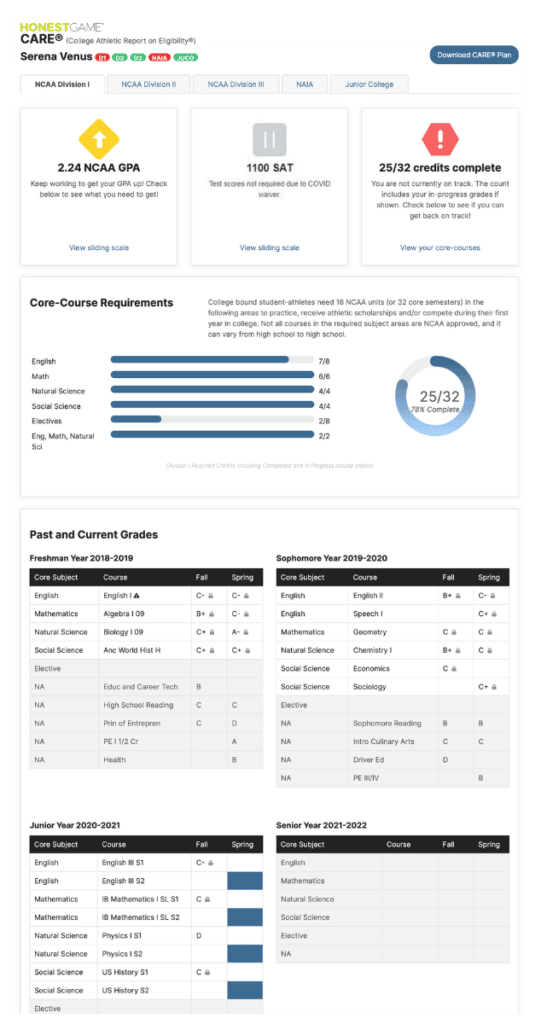Maximizing Your Summer: A Student-Athlete’s Guide to Proactive Summer School Planning
Published on Apr 25, 2024

Many student-athletes dream of continuing to play their sport in college, but some may find themselves off track for NCAA academic eligibility upon high school graduation. Often by the time student-athletes and parents realize they’re missing academic eligibility requirements, it’s usually too late to fix.
Don’t assume that academic eligibility is something that can wait until later— the clock begins the first year of high school. When you enter ninth grade, you have four years (eight semesters) to complete your NCAA Core Course requirement.
By taking charge of your academic plans now, you can ensure access to future college opportunities. It’s surprising how quickly you can turn your academic record around with extra coursework!
Key Steps to Staying on Track with Academic Eligibility
Understand the Academic Requirements for College Athletics
The NCAA requires freshman student-athletes entering NCAA Division I (DI) and Division II (DII) to complete 16 units (32 semesters) of NCAA-approved Core Courses. These courses must be completed on a specific timeline and in specific subject areas.
The NCAA also requires a minimum NCAA Core GPA to qualify, which is based on each student-athlete’s 16 NCAA-approved courses. Any courses taken that don’t fall into the designated 16 units will not count towards a student’s NCAA Core GPA.
Honest Insight – Standardized test scores (SAT/ACT) are excluded from NCAA initial-eligibility requirements however, colleges and/or scholarship programs may still evaluate test scores. Also, consider that test scores can still be used for NAIA initial eligibility.
The academic eligibility requirements are unique to each association and student-athletes must meet different requirements depending on which level the prospective school competes at.
Know Where Your Grades Stand
Not knowing your academic status is scary and many students and parents/guardians don’t know where to begin to evaluate. To simplify the eligibility process, Honest Game CARE® (College Athletic Report on Eligibility) provides an individualized report with a student-athlete’s academic eligibility status and a clear outline of short-term goals in order to be eligible at each level for college sports. CARE® is downloadable and easy to share with college coaches, parents/guardians, and high school administrators (AD, coach, and school counselors) to make sure everyone is on the same page.

Here is a real-life story of a summer school misstep and success rolled into one. As a high school football player, Naquan Jones was rated one of the top defensive tackles in the country. While he had athletic talent, he didn’t yet have the academic requirements necessary to meet NCAA academic eligibility. He had taken a summer school English course as a sophomore to ensure he was on track for high school graduation, but he did not know that the A he ended up earning in that class would not count for NCAA eligibility. His NCAA core GPA was also short of the minimum requirements.
Fortunately, Naquan had knowledgeable school support and they provided him with a detailed strategic plan (now known as the Honest Game report). Naquan followed that strategic plan, which included taking four NCAA-approved courses online (summer school) after graduation (after getting an approved EID from the NCAA). He was able to complete those courses before enrolling full-time at Michigan State University on a football scholarship. Without this step-by-step strategic plan, Naquan never would have had a clear path to an NCAA college athletic roster spot and scholarship.
Strategize How to Get or Stay on Track
Just because you have earned good grades in your high school courses, does not mean that you will be academically eligible to play sports in college.
Depending on the grades earned and the classes taken, you may need to replace one or two lower grades to improve your NCAA Core GPA or take additional courses to catch up on specific area credits.
When students fall off track, they can still get back on track by taking summer school or attending a virtual school if they plan accordingly.
Do Summer Classes Count Towards NCAA Initial Eligibility?
Yes, high school students may take NCAA-approved Core Courses at their high school during the summer to count towards their NCAA requirements. However, there is a limit to the number of summer courses that can be counted towards NCAA eligibility requirements after high school graduation.
How Many High School Summer School Credit Hours Can Count Towards NCAA Initial Eligibility?
The NCAA does not limit how many summer school courses are counted for NCAA initial-qualifier eligibility while a student is in high school. However, NCAA DI, does limit high school graduates to 1 unit (2 semesters) of NCAA-approved Core Courses between high school graduation and full-time enrollment at an NCAA DI institution.
If a student is deemed eligible for an EID (Education Impacting Disability), the NCAA DI permits taking up to 3 units (6 semesters) of NCAA Core Courses between high school graduation and full-time enrollment. NCAA DII does not limit how many NCAA-approved Core Courses are taken between high school graduation and full-time enrollment at an NCAA DII college.
When Should College-Bound Student-Athletes Take High School Summer School Courses?
Summer school is often your easiest path to becoming academically eligible. High schools usually offer summer school programming, however, be careful about what course(s) you choose.
Honest Insight: Consider the subject area(s) you need in order to meet NCAA credit requirements and ensure that your summer school courses are NCAA-approved.
Many high schools offer credit recovery or credit retrieval programs for students to receive credit for a course they previously failed. Some high schools will make an exception and allow you to take a specific NCAA-approved course at school. Ask your counselor if that’s possible.
Do Summer Classes Affect NCAA Eligibility For Division III Athletes?
The NCAA DIII does not require initial qualifier certification to participate in athletics. However, taking summer school courses can be helpful in adding rigorous course work to your high school transcript, could increase your school GPA and would show additional depth of knowledge and curiosity for learning. Having a strong academic record will give you more opportunities when it comes to admissions.
Should Student-Athletes Enroll in a Virtual (Nontraditional) Summer School?
Are you too busy with summer athletic commitments? Does your school not offer in-person course options?
If you are unable to take the specific course(s) you need in-person at school there are other options.
If your school does not offer NCAA-approved courses in the summer, students may take NCAA-approved courses with a virtual school. The virtual courses need not count toward your school’s graduation credits, however, the virtual school transcript must be submitted separately to the NCAA Eligibility Center.
Several schools offer NCAA-approved courses. These online schools don’t have to be affiliated with your high school to get you NCAA credit. However, if you need the credit for both high school graduation and NCAA credit, you should confirm with your counselor what online schools are approved for use at your specific high school.
For a nontraditional program to be approved, the courses must meet the following requirements:
- The courses must meet NCAA core-course requirements.
- The courses must have ongoing and regular teacher-initiated interaction for the purposes of teaching, evaluating, and providing assistance throughout the duration of the course. This may include synchronous or asynchronous instructive interaction, including emails, videoconferencing, online chats, phone calls, and feedback on assessments.
- The courses must have a defined time period for completion. This means the nontraditional program must identify the fastest and slowest paths to successfully complete a course.
Virtual courses require self-direction and motivation. For many students, in-person courses have a better rate of success, however, others thrive in the virtual learning environment. If virtual learning is your best option, dedicate yourself to your virtual courses so you don’t waste valuable time and money.
Some students will need to take summer school every year to catch up on NCAA requirements. It sounds daunting but consider the alternative – not getting any NCAA scholarship offers or learning you can’t take the offers you got because you didn’t meet the academic requirements.
Don’t wait another minute to get on track with academic eligibility for college sports. Need help choosing your summer school courses and virtual school? Contact us.

Having served on the NCAA Eligibility Center High School Advisory Board and as the College Bound Student-Athlete Advisor at Evanston Township High School (Evanston, IL), Joyce has advised more than 2,000 high school student-athletes and families on academic eligibility and recruiting.



